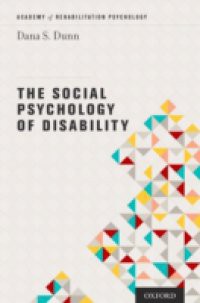This is the first book to systematically review, update, organize, and critique the literature on the social psychology of disability in 30 years. The book gives pride of place to classic as well as contemporary concepts from the social psychology of disability and rehabilitation psychology that researchers and clinicians can use or adapt for their professional venues. The books overarching message is an important one: The experience of most people with disabilities is not what nondisabled persons anticipate--contrary to the latters beliefs and expectations, the former can lead full and normal lives. Thus, The Social Psychology of Disability is designed to counter stereotypical or biased perspectives aimed at an often overlooked minority group. The primary audience for the book is rehabilitation researchers and clinicians in psychology and allied fields (e.g., social work, nursing). A secondary audience includes policy makers and graduate students in rehabilitation and clinical psychology, as well as interested undergraduates.

